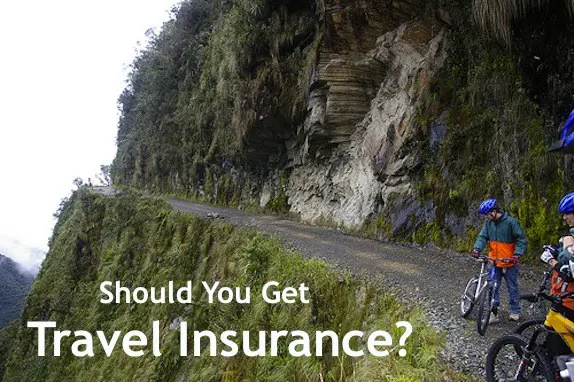The question of whether or not to get travel insurance tends to come at three main traveling junctures – right at the beginning of a trip, following a mishap (like getting robbed in Guatemala), or after years of traveling without incident. Travel insurance is one of those services you hope to never use and when you don’t, it can seem like you’re not getting a return on your investment.

Solving the conundrum of saving a bit of money against the (generally) unlikely event of incident while traveling isn’t simple and best answered with a big “it depends.”
 Understanding Travel Insurance Basics
Understanding Travel Insurance Basics
There are several travel insurance ground rules to begin with, keeping in mind that medical and coverage for your belongings are the two primary things people buy travel insurance for. I can’t stress enough that coverage varies and any policy or plan comes with a heaping tablespoon (or two) of exceptions, exemptions, and fine print.
- No Coverage At Home – Short-term travel insurance (less than 6 months especially) usually doesn’t cover you in the country you’re a resident of.
- Get Insured For As Little As A Week – Plans are generally flexible enough to provide coverage for your specific trip dates so you don’t have to purchase more time than you’re away for.
- Major Providers – World Nomads (good for making claims online), IMG (plans for continuous world travel), TravelEx, and Frommers recommends 8 others as well.
 Preexisting Conditions – Most travel insurance plans won’t cover any preexisting conditions and others will require you to be a member for up to a year or more before providing it.
Preexisting Conditions – Most travel insurance plans won’t cover any preexisting conditions and others will require you to be a member for up to a year or more before providing it.
- Caps On Electronics – Many travel insurance plans limit what you can claim on electronics (~$500). They also don’t cover your data so be sure to protect your laptops and setup a backpack security plan. (Limits on stolen cash float between $100-300.)
- Paperwork Is Required – You’ll need receipts for big-ticket items that might get stolen, police reports, and documentation for any claim you make. Your DSLR can’t be reimbursed if there’s no proof of you ever having one.
There is no shortcut to understanding a travel insurance plan. It’s always in your best interests to read the fine print, not hesitating to call or email the company for anything you’re not clear on.
Some Other Big Caveats
Don’t get me wrong, there is likely a travel insurance plan out there for you (at a price) but these are the common restrictions that are expensive to get around. Aside from the caps on electronics and restrictions on preexisting conditions, travel insurance isn’t likely to cover the following:

- Travel To Every Country – Travel insurance companies cover the major travel destinations along with many others but don’t count on countries like Iraq to be on the list. Generally speaking, international borders define coverage, so trouble in a small section of a country might eliminate it entirely.
- Certain Situations Not Covered – Unpredictable events like political demonstrations (e.g. Thailand’s Red Shirt protests), riots, terrorist attacks, outbreak of war and what might happen to you during them aren’t covered.
- HIV, Pregnancy, And Mental Conditions – Sexually transmitted diseases (STDs), in particular HIV and related costs, are not usually covered.
- Travel Warnings – If a travel warning is issued by your government for a particular nation your coverage may change. Find out what criteria prospective insurers use to determine how safe a country is.
- Prescription Drugs – Usually requires special coverage, if at all possible.
Travel insurance policies don’t cover immunizations for the most part and you’ll have to be careful with the wording of any specific coverage. The word “theft” may mean many things to you but for most insurance companies having something stolen from a hostel locker or a friend’s car won’t count.
 You May Already Have Coverage
You May Already Have Coverage
Making online reservations with a credit card may entitle you to some basic insurance, covering the cost of a canceled flight or car rental. Business travelers and contractors should never fly without knowing who’s insuring your personal belongings. Chances are if they’re used for work (even just a tiny bit), you can get them insured by your company.
Local Emergency Service – Some countries, particularly those in Western Europe, will provide emergency medical coverage if you, let’s say, break a leg. Do not take that to mean that you’ll be treated and sent off on your merry way for free however – typically all this means is you’ll be treated, even if you don’t have proof of insurance. A few stitches might not dent your travel budget but emergencies that require surgery or hospitalization are almost never covered – so you might be stuck with a huge bill once you recover from that coma.
- Reciprocal Agreements – Your country may have reciprocal health care agreements with others – Australia has 8 – which means another government might provide you with (some) health insurance coverage while visiting. Check if your country has any reciprocal agreements with the places you’ll be visiting and call your embassy for details.
Don’t ever assume you’ve got coverage – unless you can verify otherwise. Check the national department of health equivalent or the embassy website if you think there’s a reciprocal agreement in your case. Otherwise, ask your boss if you’re on the company dime and give your credit card company a call to see how they might (already be) able to protect you.
 How Much Basic Travel Insurance Costs
How Much Basic Travel Insurance Costs
Take these prices with a grain of salt and like all things insurance can change based on many factors. That said, generally you can insure a 1 week trip for around $50-75; a 6 month trip for around $300-500; and find plans for a year of extended travel starting at $800 on up. That unscientific sample was drawn from prices for a single traveler using the US, India, South Africa, and a few European nations as home and averaged out across several popular companies.
A decent rough calculation of how much travel insurance will cost you is to take your total travel costs and add 20% for an upper value.

 So, Is Travel Insurance Worth It?
So, Is Travel Insurance Worth It?
Travel insurance, as you can see, is a complex solution to a simple problem. (Multiplied for traveling families and older travelers.) Start by considering the things you want to insure – laptops and other electronic devices that depreciate quickly probably aren’t worth the capped protection but for appendicitis or a dislocated ankle it might save you tens of thousands of dollars.
It’s presumed that new travelers are more prone to theft or certain types of mishaps while it’s easy for experienced travelers to get complacent. The fact remains the chances of you suffering a medical catastrophic or otherwise are remote whether at home or on the road. The longer you travel however, without any insurance at all, the greater the odds of bad luck hitting you without a backup.
That misfortune could be a stolen camera or getting hit by a car. It’s a gamble of if it happens and how lousy. You can only look at unused insurance as money lost, or being on the road without it as cash saved – until something bad occurs. The difference is in the first case you’ll likely be much better off afterward.
[photos by: liako (bikers on world’s most dangerous road), Teeejayy (woman in thick glasses), HB Art (stack of papers), tatiana.nyanko (teddy bear nurse), Jeremy Brooks (dollars and cents), orangebrompton (balancing act)]












im thinking of getting an insurance on my next travel… i used to think that it’s not important but i got into multiple minor accidents on my last backpacking trip so i figured it might be less costly if the insurance can cover hospital bills… thanks for this information…
Where’s you research been leading you – any specific coverage you find looks best for you?
Insurance is really about making money for the insurance companies, so one must keep that in mind, as the advantages are always on their side.
We like to think of insurance as “asset protection” against major emergencies, thus we have high deductible which keeps our insurance costs very low ( as we travel the world…38 countries, 5 continents in the last 5 years of continuous travel).
We can handle the minor emergencies ( even car wreck, hospitalization in foreign countries, a paralyzed arm for a year, physical therapy, major surgery from a bike wreck etc) and have out of our pocket and still stayed within our 25K a year budget for a family of three.
BUT if there is a major life threatening and possibly permanently debilitating disease or accident or one is in a really bad place for a major problem where evacuation would be necessary…then you want to be fully covered ( especially in a ridiculously expensive place like USA which has the most outrageous health care costs and worst health care amongst industrialized nations).
In most of the world, one can get excellent health and dental care for very little money.
Our family insurance is very cheap for the whole world…except USA. We have to buy a separate insurance just for when we go to the USA…which is not often,partly because health care there is horrible.
In 5 years of travel, we have never had anything stolen, so I think being vigilant makes more sense there than insurance.
I’ve forgotten to thank you for your input on this post 🙂 So, when you were in hospital previously, you didn’t use your coverage? Seems like it could get expensive that way, curious how it panned out.
In all cases you should get travel insurance, I no that’s a wild statement but in my earlier days i did gamble with it and only traveled with my E111 Card (its free healthcare when you travel around Europe if your in the EU) I was fine never had a problem. But when I did take it out on my first gap year I had every thing stolen from in my first day! bout $5,000 worth of equipment and the insurance paid back every cent.
If I didn’t have travel insurance in all honesty I would have been destroyed I would have turned around and gone home and left the adventure.
I had travel insurance, i got support and everything including my passport was back I had every thing replaced and I was back on the road again with no worry’s and I was actually happy again. Didn’t effect me at all.
The same thing happened during the Icelandic volcano, I got stuck in japan for one week with no choice but to fend for myself, i had travel insurance, they paid for the whole lot! Luxury food and hotel and an extra week paid in Tokyo along with an all expenses paid weekend in Rome. If I didn’t have travel insurance I wouldn’t have had any money as I spent it all. Would have been the worst 10 days of my life sleeping at the airport and eating from airport vouchers and they never give you enough, I preferred hard rock cafe with thanks to the insurance.
Also my girlfriend had her whole handbag stolen in Heathrow airport, every thing is being replaced.
You may never need it, but how can you predict a volcano? Be very careful! You have been warned!
Travel with reassurance get insurance (and no i don’t work for world nomads lol)
http://www.youtube.com/watch?v=ytakHwz5dB8
That video expresses what a complete and utter frustrating mess having (everything) stolen on the road can be. Definitely worth watching to give anyone at least a shot in the arm in that direction.
Hi Anil,
thanks for another interesting post! It lets me know a bit more about insurances in the US.
For us Europeans the situation is completely different. I have a travel insurance and there is NO REASON whatsoever why one shouldn’t have one: it costs only some 5 euros per month (and it’s the Premium one, there is even a cheaper basic option) and covers pretty much everything, up to – creepy detail – the cost of bringing your body back home if needed :p
Once I was sick in Turkey, had to go to the hospital and missed my outgoing journey, so I had to buy new tickets. I scanned the receipts, claimed them back and I was fully refunded, no questions asked! Likewise, I sent the Turkish hospital bill to the health insurer and refund arrived in a few days. Hooray for Dutch insurances!
Hi Fabio, thank you for the kind words. Were you using an exclusively Dutch travel insurance?
Yes, my travel insurance is exclusively Dutch. I have it together with a few other insurances (house, etc) by one single bank, which gives a few percentage points discount on a yearly basis.
I think everyone should get travel insurance, for every trip. Some people may think its overkill or a waste of money if you go without incident and don’t file a claim, but it is worth the money!
Three years ago my sister and brother in law were killed in a car accident while traveling. Their travel insurance covered all costs associated with emergency services, coroners reports, repatriation of remains over state lines and transport of remains internationally and came with a small life insurance policy that was paid to the families to cover funeral expenses.
As a traveler, you personally may not be thinking in such drastic terms (really, what are the chances you’ll die or be seriously injured on your next trip?) but if something were to happen, who gets stuck with the expense? Probably your family. And if the incident is life threatening or actual death, the last thing your family should have to think about is how to pay for medical treatment or repatriation of remains internationally.
Its a convoluted system that is stressful and emotionally draining, but having someone (insurance company) on your side to handle all the logistical details takes the burden off your shoulders.
I know this is an extreme example, but I really do think travel insurance is worth the money, if only for the peace of mind and security it provides for the traveler and their family.
Hi Kelly, I think that situation highlights when travel insurance becomes virtually essential; though I’m sorry the example is such a personal one. Can I ask if the coverage in that case was run of the mill so to speak – were there additional costs or anything big that wasn’t covered?
The coverage was a standard policy and there weren’t any additional add-ons (my sister was quite frugal). I don’t recall the actual name of the provider, but it was an Australian company as she was living in Oz, but traveling in the US at the time of the accident. I can’t think of anything that was not covered.
Thanks Kelly for following up, I appreciate it.
After watching a fellow backpacker break his leg while drunk in Prague, I’ve been a stickler for travel insurance. I rarely get sick and I’ve never had anything stolen, but since I’m not insured at home–what the heck would I do if I fell, slipped, etc.? I haven’t had to use it yet, but I think it’s worth it just for the peace of mind.
I wonder if that person had insurance! A broken leg is one of those things you can’t try and fight your way through like the flu or simple sprain might be.
I have only used travel insurance once when it was mandatory and that was the trip to Antarctica because they need to be able to evac you if needed. Other than that I have never used any trip insurance of any kind. I did get robbed once but they only took my camera and cell phone, I think of all the trips I have taken I am still up. If I do travel to a very dangerous country then I def will consider though
I can see them requiring it for Antarctica, plus it helps the company cover themselves as well.
No insurance is perfect, but I’d rather have the security and peace of mind. Actually, my travel insurance with World Nomads has covered a cracked crown that needed to be replaced where most regular insurance plans in the US would never cover that. But, I’ve noticed that the bureaucracy and paperwork for submitting claims (for US citizens) has increased in the last few years…not a good development.
That’s unfortunate and somewhat surprising – but at the same time not! It seems the US is a special case for so many travel insurance policies due to the complexity of the patchwork system there.
I think it’s worth it when traveling in places where the medical care is expensive, like in Switzerland.
I wouldn’t go skiing in Switzerland without insurance, for example!
I love that example – doing something that increases your chance of injury greatly while in a very expensive country – a good combination for travel insurance.
I’ve heard that it depends on the policy though. Skiing may not be covered by every travel insurance policy.
I was told that, often, travel insurance doesn’t cover adventure sports or other risky activities such as renting and riding a scooter or motorcycle. Thats one topic related to travel insurance that I wish I could hear more about. Too bad, I don’t see anything about that in here (unless I missed it?).
That is true, you really need to check the specific policy. I’ll be happy to write more about this in the coming weeks for you. Keep your eye out for new posts in any of these ways:
http://foxnomad.com/about/
Nice summary. However – If you are an around the world traveler and have left your job to travel for an extended time – do consider what you will plan to do when you get back to your home country – specifically America. Most of these plans are not considered eligible for continuous coverage. So you may have trouble getting covered when you get back to the US. Each person’s situation is different – but do think past the trip and what you will do when you return home and what if you pick up a condition while you are on the road that won’t be insurable when you get home. All doom and gloom I know – and rare…but good to know.
I will also throw my travel/med insurance into the mix of options – I use HTH Worldwide and love it. It’s more for expats and continuous travelers. Offers way more than regular travel coverage – but also covers you back in the US under the Aetna network…so you never have a lapse in coverage.
Thank you for that Sherry; I think hearing about specific policies is great information for those trying to figure out the best plan for their situation. Especially for US citizens where health care is confusing to say the least.
I think one thing that’s worth pointing out is that it is much more expensive to get travel insurance if your home country does not offer free healthcare, like the US. So, while your pricing might be right for a US citizen, it’s very, very high for an EU citizen.
I paid under $450 for a year’s cover for me and my son, comprehensive, global cover (excluding, from memory, Libya and Afghanistan only). But we’re British citizens, so if we require medical care at home we’ll get it for free.
I’d also recommend that people start looking for insurance for their trip on price comparison sites, like http://www.moneysupermarket.com, rather than necessarily going with the big names.
And, yeah, travelling without insurance is a mug’s game.
Thank Theodora for pointing that site out – I’m guessing most people might skip the comparison sites simply because they don’t know about them for travel insurance. Honestly it hadn’t occurred to me to consider this much easier and efficient search method!
I’ve never gotten travel insurance before, and it’s never been a problem. I would definitley consider it if i was going to more extreme places though!
That’s the tricky thing about insurance, not using it is a double-edged sword!
Anil, this is a great article. I’m lucky that Ryan handles everything about the insurance, but if he doesn’t, this article will be a huge help for me in deciding one.
Thanks Dina – lucky for you, it’s a big weight off the shoulders 🙂
I hold fast to the fact if you were living at home then you would have insurance for you car, home, contents, health etc. That’s a lot of cost your dumping when you hit the road to travel. Surely you can then afford the few $$ to cover yourself while abroad.
I think where people get caught up in is coverage; they don’t quite know the travel insurance is useful in many more scenarios that complete disaster (although then it comes in handy too).
I have been looking forward to this post (and yes I realize how late I am in reading it) and I have a feeling I’ll be coming back to it as a resource. As I mentioned in one of my previous comments, being from the US I have a bad taste in my mouth when it comes to insurance and health care costs in general.
When I was in Australia I got sick and had to go the the Uni doctor and pay for a prescription, I had insurance through my school but ended up paying anyway because I didn’t know a thing about how to make a claim. It was still a small price to pay (around $60 for everything I think). In the US I had insurance and was still paying hundreds of dollars for simple visits to the doctor and dentist AFTER the insurance did its part!
My boss (who is Australian) has been living in Italy for 10 years and has always used World Nomads and absolutely praises it! She said she has had everything ever stolen replaced and covered (including her brother’s phone when he was visiting) and never had issues.
Her advice and all the advice here in the comments has definitely made me second guess my decisions. Sherry’s suggestion is very helpful as far as coverage when you return to the States!
Thanks for this awesome article and all the great follow-up, I’ll definitely be referring back as we start preparation for our next journey.
Never too late to the comment party! I’m glad you found this post (and the incredibly poignant comments) useful. There are a lot of good plans out there for a number of travel styles and it doesn’t hurt to have some protection 🙂
Hi Anil,
We just launched a new travel insurance site: http://www.tripinsurance.com. We set up exclusive deals with four of the leading insurers to sell insurance direct from the insurance company to the traveler at a significant discount. (25% or more in most cases) Fewer middle men in the process allows us to pass the savings on to the consumer. We offer our insurance in three groups of good/better/best. Good is the most economical. Best has cancel for any reason. We have a pre-existing condition waiver if you buy the insurance within 14 days of your initial deposit. One of our plans even has non-medical emergency evacuation in the event of riots or problems that cause recommendations for tourists to leave the country.
I am just starting an affiliate program too, – working with travel blogs and would like to know your interest.
Thanks,
Dan
Hi Dan,
I was hesitant to approve this comment – it’s much too like an ad which made me a bit uncomfortable. That said, I’d like to hear if anyone else here in the comments has used your service and don’t mind the second opinion.
If you’d like to discuss anything else, feel free to email me:
http://www.foxnomad.com/contact/